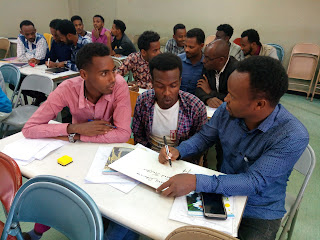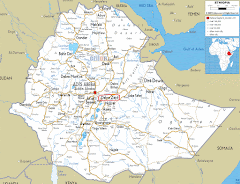“Moo. Moo.” That’s the sound I wake up to each day. Meserete Kristos Seminary currently has eight cows and two heifers, along with several bulls and oxen. The cows wander around campus while grazing near the guesthouse where I live or on the main green. As they munch on the dirt and dry grass, they are oblivious to the students chatting in their midst.
There’s only one tiny sidewalk on our campus. The other walkways are dirt roads and paths, which turn to mud in the rainy season. Cats abound—20 or 30 of them. Though they’re fed injera scraps from the dining hall each day, they’re sickly and mangy looking. I couldn’t bring myself to photograph them.
From my balcony, I see our clothesline and the greenhouse in the distance.
Students often comment how much they love the green areas of campus, the farmland, and the peacefulness of it all. Most of our students come from farmer families, so they grew up plowing, planting and harvesting crops (mostly grains), and caring for their animals. Students enjoy telling me about their family farms, and I love to listen.
Addisu, the head of agriculture at MKS, gave me a farm tour the other day.
The MKS cows are raised mostly for their milk. The milk is given to employees of the seminary, namely the agricultural workers and kitchen staff who put in long hours each day and don’t get paid that much. The surplus milk is sold to the public.
Occasionally, a cow is slaughtered, providing beef for the meat stew that is served once a week in the campus dining hall. (The other 20 meals a week are vegetarian.) Onions, carrots, potatoes, and cabbage are grown as food for the campus community.
500 chickens lay 375 eggs a day. Some of the eggs are scrambled twice a week for breakfast. The rest are sold to campus employees and people from Bishoftu, who can be seen walking off carrying their flat of 30 eggs. Eggs are the main income-generating part of the MKS farm. 30 eggs cost around $6.00.
The farm workers that I met on my tour seemed happy to meet me and happy in their jobs too. Ashenafi was watching over the cows as they grazed. With two oxen, Melaku was plowing a field that would become a seed bed. Biri and Aberash were milking cows. Ileni, Meskeram, and Tamenech were harvesting onions. When Addisu introduced me, he often told me the meaning of their names. Melaku means angel, Ileni means “the queen of” Sheba, Meskeram means September (her birth month), and Tamenech means believer.
Near the two dormitories, a group of staff and students were shoveling rocks and branches out of the soil, where a soccer field will be created.
Haji, the main gardener who takes care of the plants and flowers on campus, is standing in the front of this photo.
Haji and I greet each other “Good morning” and chat for a few minutes on the days we see each other. Like Addisu, his English is very good, and like Addisu, he loves what he does. I’m surrounded by happy, friendly people here on the farm of Meserete Kristos Seminary.

.jpg)



















